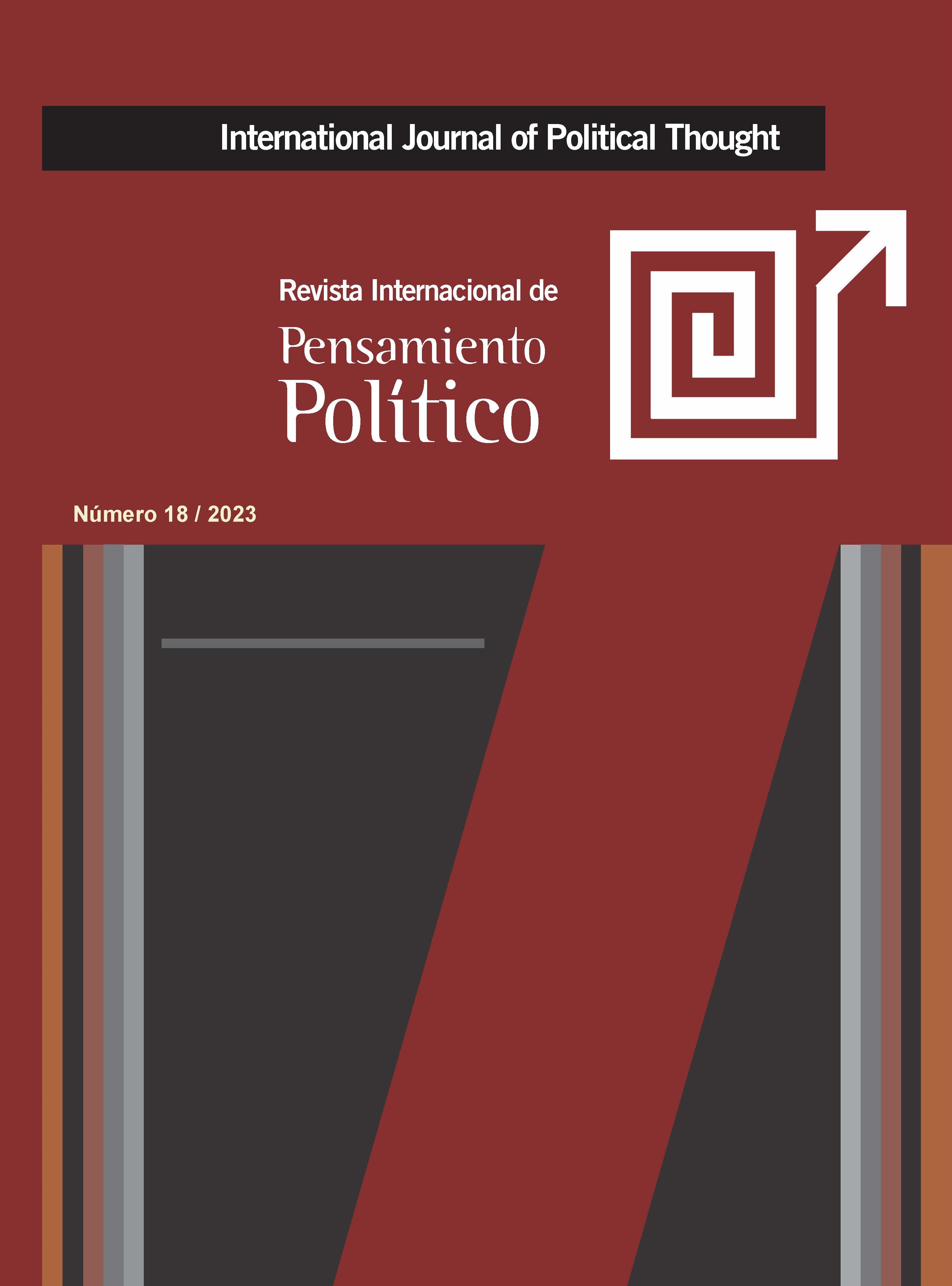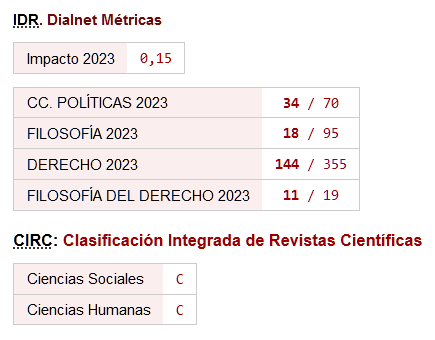Igualdad y creencias discriminatorias
de las ciencias psicológicas al ámbito jurídico
DOI:
https://doi.org/10.46661/revintpensampolit.8756Palabras clave:
prejuicio, racismo, sexismo, discriminación estructural, acceso a la justiciaResumen
Los prejuicios, sesgos y estereotipos dañinos pueden formar parte de sistemas de creencias que apoyen ideologías discriminatorias. El objetivo de este artículo es poner el foco en estas formas de discriminación que inciden en el logro de una igualdad efectiva en la realidad social y jurídica. Para ello, se tomarán en consideración algunas teorías psicológicas desarrolladas con respecto al racismo y al sexismo que identifican formas encubiertas de prejuicios. Posteriormente, se hará referencia a la creciente atención por parte del legislador a elementos que conforman una cultura discriminatoria y como estos pueden vulnerar el acceso a la justicia.
Descargas
Citas
Allport, G. W. (1954). The nature of prejudice. Cambridge, Massachusetts: Addison-Wesley Publishing Company, Inc.
ASALE, R.-, & RAE. (s.d.). Práctica | Diccionario de la lengua española. Recuperato 15 settembre 2023, da «Diccionario de la lengua española»-Edición del Tricentenario website: https://dle.rae.es/práctica
Bandura, A. (1986). Social foundations of thought and action: A social cognitive theory (pp. xiii, 617). Englewood Cliffs, NJ, US: Prentice-Hall, Inc.
Barrère Unzueta, M. Á. (2018). Filosofías del Derecho antidiscriminatorio: ¿qué Derecho y qué discriminación? : una visión contra-hegemónica del Derecho antidiscriminatorio. Anuario de filosofía del derecho, 11-42. https://doi.org/10.53054/afd.vi34.2326 DOI: https://doi.org/10.53054/afd.vi34.2326
Bastias, F., Ungaretti, J., Barreiro, A., & Etchezahar, E. (2022). Adaptación y validación de la escala de prejuicio sutil y manifiesto hacia personas en situación de pobreza. Revista de ciencias sociales, 28, 352-366.
Becker, J. C., & Wright, S. C. (2011). Yet another dark side of chivalry: Benevolent sexism undermines and hostile sexism motivates collective action for social change. Journal of Personality and Social Psychology, 101, 62-77. https://doi.org/10.1037/a0022615 DOI: https://doi.org/10.1037/a0022615
Bem, S. L. (1981). Gender schema theory: A cognitive account of sex typing. Psychological Review, 88, 354-364. https://doi.org/10.1037/0033-295X.88.4.354 DOI: https://doi.org/10.1037//0033-295X.88.4.354
Bernardini, M. G. (2016). Disabilità, giustizia, diritto. Itinerari tra filosofia del diritto e Disability Studies. G. Giappichelli Editore.
Bernardini, M. G. (2017). Le teorie critiche del diritto: Soggettività in mutamento. In O. Giolo & M. G. Bernardini (Editado por), Le Teorie Critiche del Diritto (pp. 13-34). Pisa: Pacini Editore.
Bernardini, M. G. (2020). La capacità vulnerabile. Napoli: Jovene.
Bernardini, M. G., & Giolo, O. (Editado por). (2017). Le Teorie Critiche del Diritto. Pisa: Pacini Editore.
Bourdieu, P. (2000). La dominación masculina (J. Jordá, Trad.). Barcelona: Editorial Anagrama.
Canevello, A. (2020). Gender Schema Theory. In V. Zeigler-Hill & T. K. Shackelford (A c. Di), Encyclopedia of Personality and Individual Differences (pp. 1741-1743). Cham: Springer International Publishing. https://doi.org/10.1007/978-3-319-24612-3_978 DOI: https://doi.org/10.1007/978-3-319-24612-3_978
Castro Rivera, A. (2022). Estereotipos de género y práctica jurídica. Revista de la Facultad de Derecho. https://doi.org/10.22187/rfd2022nesp1a3
Díez-Picazo Giménez, I. (2000). Reflexiones sobre algunas facetas del derecho fundamental a la tutela judicial efectiva. Cuadernos de derecho público, 13-38.
Dovidio, J. F., & Gaertner, S. L. (2004). Aversive racism. In M. P. Zanna (A c. Di), Advances in experimental social psychology (Vol. 36, pp. 1-52). San Diego, CA, US: Elsevier Academic Press. https://doi.org/10.1016/S0065-2601(04)36001-6 DOI: https://doi.org/10.1016/S0065-2601(04)36001-6
Dovidio, J. F., Gaertner, S. L., & Kawakami, K. (2010). Racism. In J. F. Dovidio, M. Hewstone, P. Glick, & V. M. Esses (A c. Di), The SAGE Handbook of Prejudice, Stereotyping and Discrimination (pp. 312-327). London: SAGE Publications Ltd. https://doi.org/10.4135/9781446200919.n19 DOI: https://doi.org/10.4135/9781446200919.n19
Duckitt, J. (2010). Historical Overview. In P. Glick, J. F. Dovidio, M. Hewstone, & V. M. Esses (A c. Di), The SAGE Handbook of Prejudice, Stereotyping and Discrimination (pp. 29-44). London: SAGE Publications Ltd. https://doi.org/10.4135/9781446200919.n2 DOI: https://doi.org/10.4135/9781446200919.n2
Eagly, A. H., Wood, W., & Diekman, A. B. (2000). Social role theory of sex differences and similarities: A current appraisal. In The developmental social psychology of gender (pp. 123-174). Mahwah, NJ, US: Lawrence Erlbaum Associates Publishers.
Facio, A., & Fries, L. (2005). Feminismo, género y patriarcado. Academia: revista sobre enseñanza del derecho de Buenos Aires, 3, 259-294.
Garaigordobil Landazabal, M., & Aliri Lazcano, J. (2011). Sexismo hostil y benevolente: Relaciones con el autoconcepto, el racismo y la sensibilidad intercultural. Revista de psicodidáctica, 16, 331-350.
Gil Ruiz, J. M. (2007). Los diferentes rostros de la violencia de género: Ensayo jurídico a la luz de la Ley integral (L.O. 1/2004, de 28 de diciembre) y la Ley de igualdad (L.O. 3/2007, de 22 de marzo). Dykinson.
Gil Ruiz, J. M. (2012). Las nuevas técnicas legislativas en España: Los informes de evaluación de género. Recuperato da https://dialnet.unirioja.es/servlet/libro?codigo=670460
Gil Ruiz, J. M. (2014). La filosofía del derecho: Entre un nuevo derecho amenazado y una ciencia jurídica desfasada. Anuario de filosofía del derecho, 241-270.
Gil Ruiz, J. M. (2015). Formación en Derecho antidiscriminatorio: Carencias e incumplimientos institucionales. Academia: revista sobre enseñanza del derecho de Buenos Aires, 13, 49-77.
Glick, P., & Fiske, S. T. (1996). The Ambivalent Sexism Inventory: Differentiating hostile and benevolent sexism. Journal of Personality and Social Psychology, 70, 491-512. https://doi.org/10.1037/0022-3514.70.3.491 DOI: https://doi.org/10.1037//0022-3514.70.3.491
Glick, P., & Fiske, S. T. (2001). Ambivalent sexism. In Advances in Experimental Social Psychology (pp. 115-188). Academic Press Inc. https://doi.org/10.1016/S0065-2601(01)80005-8 DOI: https://doi.org/10.1016/S0065-2601(01)80005-8
Glick, P., Fiske, S. T., Mladinic, A., Saiz, J. L., Abrams, D., Masser, B., … López, W. L. (2000). Beyond prejudice as simple antipathy: Hostile and benevolent sexism across cultures. Journal of Personality and Social Psychology, 79, 763-775. https://doi.org/10.1037/0022-3514.79.5.763 DOI: https://doi.org/10.1037//0022-3514.79.5.763
Glick, P., & Rudman, L. A. (2010). Sexism. In J. F. Dovidio, M. Hewstone, P. Glick, & V. M. Esses (A c. Di), The SAGE Handbook of Prejudice, Stereotyping and Discrimination (pp. 328-344). SAGE Publications Inc. https://doi.org/10.4135/9781446200919.n20 DOI: https://doi.org/10.4135/9781446200919.n20
Henry, P. J. (2010). Modern Racism. In J. Levine & M. Hogg (A c. Di), Encyclopedia of Group Processes & Intergroup Relations (pp. 576-577). Thousand Oaks: SAGE Publications, Inc.
Henry, P. J., & Sears, D. O. (2002). The Symbolic Racism 2000 Scale. Political Psychology, 23, 253-283. JSTOR. https://doi.org/10.1111/0162-895X.00281 DOI: https://doi.org/10.1111/0162-895X.00281
Jones, J. M. (1997). Prejudice and racism (2nd ed). New York: McGraw-Hill Companies.
Laxe, S., Bernabeu, M., López, R., García, A., & Tormos, J. M. (2010). Clasificación internacional del funcionamiento, de la discapacidad y de la salud en Rehabilitación: De la teoría a la práctica. Rehabilitación, 44, 152-157. https://doi.org/10.1016/j.rh.2009.10.007 DOI: https://doi.org/10.1016/j.rh.2009.10.007
Lee, T. L., Fiske, S. T., & Glick, P. (2010). Next Gen Ambivalent Sexism: Converging Correlates, Causality in Context, and Converse Causality, an Introduction to the Special Issue. Sex Roles, 62, 395-404. https://doi.org/10.1007/s11199-010-9747-9 DOI: https://doi.org/10.1007/s11199-010-9747-9
Lousada Arochena, J. F. (2014). El derecho fundamental a la igualdad efectiva de mujeres y hombres: Fundamentos del derecho a la igualdad de género y, en especial, su aplicación en el derecho del trabajo y de la seguridad social. Valencia: Tirant lo Blanch.
Lousada Arochena, J. F. (2015). Fundamentos del derecho a la igualdad de mujeres y hombres. México: Tirant Lo Blanch.
Lousada Arochena, J. F. (2022). Evolución de la igualdad desde la Constitución de 1978: Del patriarcado fuerte hacia la igualdad de género. iQual. Revista de Género e Igualdad, 1-27. https://doi.org/10.6018/iqual.498191 DOI: https://doi.org/10.6018/iqual.498191
Magro Servet, V. (2022). Perspectiva de género en las decisiones judiciales: Novedades jurisprudenciales. Anales de la Cátedra Francisco Suárez, 111-148. https://doi.org/10.30827/acfs.vi.25194 DOI: https://doi.org/10.30827/acfs.vi.25194
McConahay, J. B. (1986). Modern racism, ambivalence, and the Modern Racism Scale. In Prejudice, discrimination, and racism (pp. 91-125). San Diego, CA, US: Academic Press.
McConahay, J. B., Hardee, B. B., & Batts, V. (1981). Has Racism Declined in America?: It Depends on Who is Asking and What is Asked. Journal of Conflict Resolution, 25, 563-579. https://doi.org/10.1177/002200278102500401 DOI: https://doi.org/10.1177/002200278102500401
Morondo Taramundi, D. (2023). Los estereotipos como mecanismos de desigualdad y alienación: Un análisis desde el derecho antidiscriminatorio. Oñati Socio-Legal Series, 13, 710-729. https://doi.org/10.35295/osls.iisl/0000-0000-0000-1381 DOI: https://doi.org/10.35295/osls.iisl/0000-0000-0000-1381
Pérez Dalmeda, M. E., & Chhabra, G. (2019). Modelos teóricos de discapacidad: Un seguimiento del desarrollo histórico del concepto de discapacidad en las últimas cinco décadas. Revista Española de Discapacidad (REDIS), 7, 7-27. https://doi.org/10.5569/2340-5104.07.01.01 DOI: https://doi.org/10.5569/2340-5104.07.01.01
Pérez Luño, A. E. (1987). Sobre la igualdad en la Constitución española. Anuario de filosofía del derecho, 133-152.
Pettigrew, T. F., & Meertens, R. W. (1995). Subtle and blatant prejudice in western Europe. European Journal of Social Psychology, 25, 57-75. https://doi.org/10.1002/ejsp.2420250106 DOI: https://doi.org/10.1002/ejsp.2420250106
Poggi, F. (2016). Che genere di diritto?: Un'analisi concettuale delle diseguaglianze giuridiche di genere. In O. Giolo & B. Pastore (A c. Di), Diritto, potere e ragione nel pensiero di Letizia Gianformaggio (pp. 43-64). Jovene editore.
Reyes Cano, P. (2018). La vulneración de los derechos fundamentales de los menores en un contexto de violencia de género: Una realidad a considerar en las políticas públicas. Revista Vasca de Administración Pública. Herri-Arduralaritzako Euskal Aldizkaria, 245-289. https://doi.org/10.47623/ivap-rvap.112.2018.07 DOI: https://doi.org/10.47623/ivap-rvap.112.2018.07
Reyes Cano, P. (2022). En torno a la coordinación de parentalidad: ¿garantías o desprotección de los derechos de la infancia? Anuario de filosofía del derecho, 185-214. https://doi.org/10.53054/afd.vi38.9744 DOI: https://doi.org/10.53054/afd.vi38.9744
Rubio Castro, A. M. (2007). La capacidad transformadora del derecho en la Violencia de Género. Circunstancia: revista de ciencias sociales del Instituto Universitario de Investigación Ortega y Gasset, 8.
Sánchez Busso, M. (2018). Acceso a la justicia. El ejercicio de un derecho humano fundamental en mujeres víctimas de violencia de género. In J. M. Gil Ruiz (A c. Di), El Convenio de Estambul como marco de derecho antisubordiscriminatorio (pp. 349-371). Dykinson. https://doi.org/10.2307/j.ctv6hp3p8.16 DOI: https://doi.org/10.2307/j.ctv6hp3p8.16
Soriano Moreno, S. (2022). Cuando los estereotipos de género limitan derechos fundamentales: El acceso a la justicia de la infancia. Feminismo/s, 337-367. https://doi.org/10.14198/fem.2022.40.14 DOI: https://doi.org/10.14198/fem.2022.40.14
Štajnpihler Božič, T. (2021). Putting gender through law school. Reflections on legal education and gender equality in Slovenia. Diritto & Questioni Pubbliche, 23, 119-136.
Swim, J. K., & Hyers, L. L. (2009). Sexism. In T. D. Nelson (A c. Di), Handbook of prejudice, stereotyping, and discrimination (pp. 407-430). New York, NY, US: Psychology Press.
Vaamonde, J. D., & Omar, A. G. (2017). Perceptions of organizational justice and ambivalent sexism: The moderating role of individualism-collectivism. Revista de Psicología, 35, 31-60. https://doi.org/10.18800/psico.201701.002 DOI: https://doi.org/10.18800/psico.201701.002
Zárate, M. A. (2009). Racism in the 21st century. In T. D. Nelson (A c. Di), Handbook of prejudice, stereotyping, and discrimination (pp. 387-406). New York, NY, US: Psychology Press.
Descargas
Publicado
Cómo citar
Número
Sección
Licencia
Derechos de autor 2023 Anna de Giuli

Esta obra está bajo una licencia internacional Creative Commons Atribución-NoComercial-CompartirIgual 4.0.
Política de acceso abierto
Se permite el acceso libre y abierto de cualquier interesado a todos los contenidos de los números de la revista, sin costo alguno, pudiendo imprimir y trasladar todos los artículos, con la única condición de precisar la fuente y la autoría.
La revista: a) no cobra a las autorías costes por el procesamiento de los artículos ni por el envío de los mismos, b) mantiene el copyright para los autores sin restricciones, c) facilita a los autores conservar sus derechos de publicación sin limitaciones.
La Revista Internacional de Pensamiento Político es una obra original del Laboratorio de Ideas y Prácticas Políticas de la Universidad Pablo de Olavide. Todos los artículos incluidos en la Revista son obra original de sus respectivas autorías. Esta Revista se ofrece libremente a la comunidad científica y académica sin coste alguno y libera los contenidos de acuerdo a la licencia "Reconocimiento-NoComercial-CompartirIgual 4.0 CC BY-NC-SA" del proyecto Creative Commons dispuesta en la siguiente url: https://creativecommons.org/licenses/by-nc-sa/4.0/legalcode
Si deseas traducir o compilar alguno de los artículos aquí disponibles, por favor, ponte en contacto













